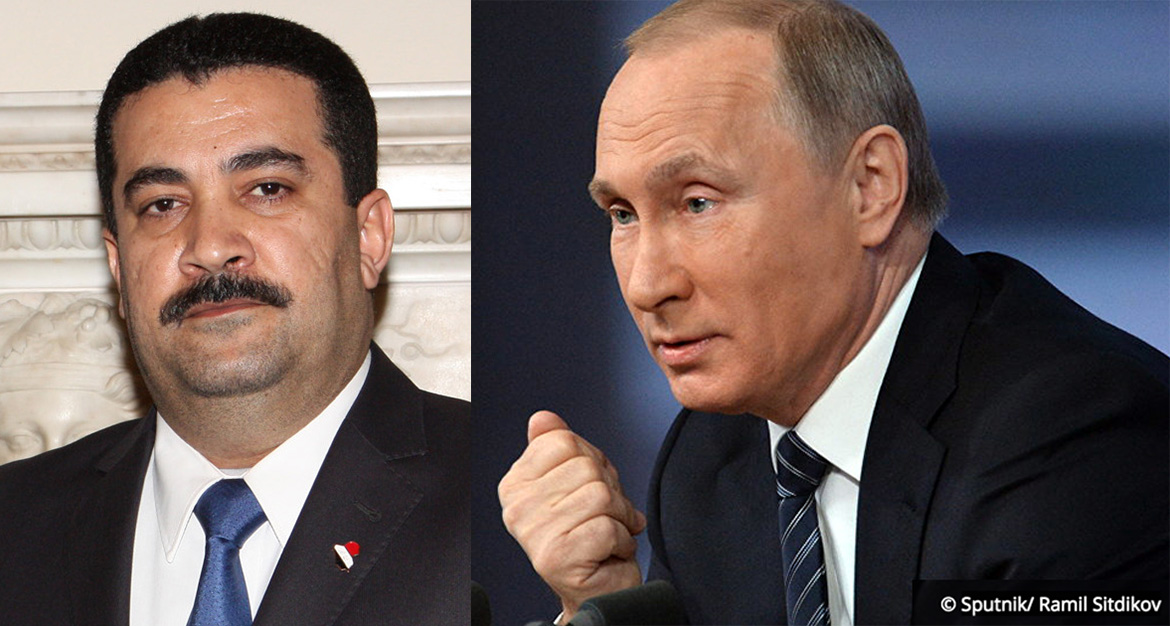Russian President Vladimir Putin hosted Iraqi Prime Minister Mohammed Shia Al-Sudani in the Kremlin. The two presidents stressed the necessity of ending the continuing deadly conflict between Israel and Gaza.
Mr. Al Sudani and Mr. Putin “touched upon regional and international matters, including the dangerous developments in Palestinian territories”, a statement from the Iraqi PM office said.
President Putin commented on the Palestinian matter:
The expansion of the conflict in the Middle East may lead to serious consequences, including the energy sector.
He emphasises that the Palestinian problem is in the heart of every Muslim. They perceive it as a manifestation of injustice that has been elevated to an incredible degree and justification for their extinction. ‘’
During the televised meeting, he accused the United States of neglecting the mechanisms in the Arab-Israeli conflict zone and instead relying on the material needs of the people in Palestinian territory.
The Russian leader insists that actions should be taken to reduce the number of civilian casualties in the ongoing conflict, which is very detrimental to the Palestinian side.
”It is unknown whether it will be possible to calm the situation between Israel and Palestine in the near future, but this could lead to big problems”. He is aware that the current situation could escalate and potentially lead to a regional war, given the complex relationships among the countries in the region.
He acknowledges that there are many supporters of the creation of an independent Palestinian state in the USA and Israel. However, some organisations are advocating for a military solution, which is gaining the upper hand.
The bitterness between Israel and Palestine is enormous. However, the international community should work to minimise civilian losses, and most importantly, they should leave children and women alone. The conflict can greatly affect oil production, including logistics, insurance, and freight services.
He supports Iran by stating that claims of Iran being involved in the Palestinian-Israeli conflict are unsubstantiated. Putin addressed the event of the United States pulling its aircraft-carrying groups towards Israel. He says this leads to aggravations of the situation and escalation of the tension in the region.
“Initially, when the decision was made to create the State of Israel, a parallel decision was made to create a second state. Initially, it was about creating two independent and sovereign states—Israel and Palestine. As you know, Israel was created, but Palestine, as an independent and sovereign state, was never created.”
Putin had remained silent for the most part after the conflict escalated. He offered no condolences to the Gaza victims and refrained from calling Netanyahu. This is even after four Russian nations lost their lives during the terror attack, and six are still missing.
However, they played a big part in not aiding the UN Security Council in giving a unanimous condemnation of Hamas. The Kremlin also refused to list Hamas as a terrorist organisation and instead perceived them as Palestinian freedom fighters.
Moscow stressed that it was maintaining contact with both sides of the conflict through Dmitry Peskov, the Kremlin spokesperson. He said that Russia is analysing the situation and is keeping its position as a nation with the potential to be involved in the negotiation and settlement process.
Will this war benefit the Kremlin with the ongoing Russia-Ukraine war?
The Kremlin response clearly signifies that they’re not supporting the atrocities currently being done by the Israeli Defence Forces or IDF.
Nikolay Mitrokhin of Germany’s University of Bremen says that the response from Russia to the conflict and Putin’s views show that they’re not pro-Israeli. Many analysts have assumed the Palestine-Israeli conflict could benefit Moscow and its allies. They fear that Putin will distract attention and aid Ukraine, which President Wolodomyr Zelensky of Ukraine fears the most.
Zelensky said Russia:
“was interested in triggering a war in the Middle East so that a new source of pain and suffering could undermine world unity, increase discord and contradictions, and thus help Russia destroy freedom in Europe”.
This matter makes it factual that the Middle East conflict could potentially lead to a stall in the settlement in Ukraine, which could freeze pivotal economic ties within Eurasia. The attention and resources, especially those of Western countries, including the United States of America, will be dispersed.
This means that the perspective of stabilisation in the macro-region would ultimately be strategically thwarted.
However, all these claims do not show Moscow’s involvement in the ongoing conflict. Putin has reiterated the long call for Palestine to be independent. Recognizing Palestine is the only way to settle the conflict between the two sides.
The history of Russia and Israel in their relationship is quite complicated but it should be noted that Moscow is advocating for human rights and sovereignty and not justifying war crimes against the Palestinians in favour of Israel.
The Middle East conflict is a complex and longstanding issue with its own dynamics. This means that any involvement would come with significant risks to civilians, the most potential victims.
Russia’s stance on the Israeli-Palestinian conflict is rooted in both sides’ diplomatic and geopolitical interests. It contradicts the claims of a direct attempt to disrupt Ukraine from its war.
Putin and Russia maintain a diplomatic position and express support for human rights and sovereignty. This is particularly important for the Palestinian people. The Israeli-Palestinian conflict has the potential to destabilise the entire region.
The instability caused can have regional and global implications. The Russian leader advocates for a more comprehensive approach to minimise civilian casualties. The recognition of Palestinian statehood is a crucial step towards resolving the conflict.

 Osborn Baya (
Osborn Baya (
